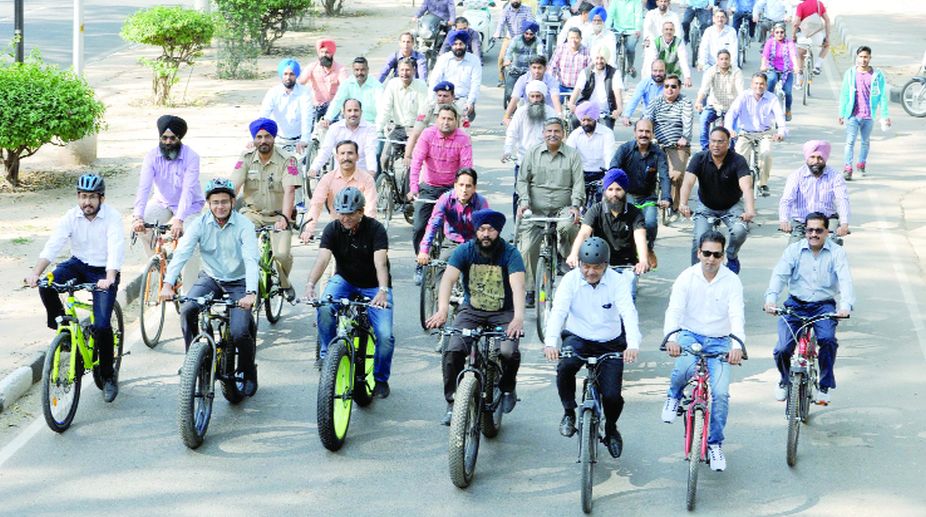Minister urges cycle manufacturers to offer incentives to encourage cycling
Union Minister of Youth Affairs & Sports Mansukh Mandaviya Tuesday urged cycle manufacturers to offer incentives to encourage cycling across all age groups.

To promote cycling for good health, the Municipal Corporation of Chandigarh (MCC) has recently taken the initiative to make it mandatory for all its employees to come to work on cycle every Wednesday.
However, after witnessing some mild opposition from the employees, the MCC appears to have gone soft by exempting them on certain conditions. The MCC Commissioner Jitender Yadav said that only persons having genuine excuse will be spared on medical grounds while all others will have to come to office by cycle only. Employees coming from outskirts of Chandigarh can avail of public transport. He directed all Head of Departments (HoDs) to ensure proper compliance of the order every Wednesday and submit a report about it. He also instructed the employees to use the cycle tracks and give their suggestions about its advantages.
Advertisement
The Commissioner said the decision has been taken to promote cycling in the city and as it is a health benefit for MCC employees that will ensure efficiency in office work. The Commissioner said he would order all those coming on cycle to buy helmets as well. Yadav directed that even if anybody needs to go to the UT secretariat or any other office, he would have to use a cycle. “Only emergency vehicles like fire tenders will use vehicles on Wednesday,” he added. Mayor of Chandigarh Devesh Moudgil, who led an all MCC employees cycle rally in Chandigarh, said the major motive of the rally was to highlight the capability of women to provide security, stability and progress in every field of activity.
Advertisement
He has suggested that even councillors should come on cycles on the day of the House meetings. Moudgil also comes to office by cycle on Wednesdays and he stated, “I have requested all the councillors to start using cycles. Not only will the congestion on city roads be eased but even from the health point of view it is good,” he said. Most councillors, on the other hand, said it was not a practical decision at all, not only for them but for the employees as well. “It should not be made mandatory for employees either. It should be optional. Now, I cannot ride a cycle at all. Let this come from within and not be enforced on the employees,” said BJP councillor and former mayor Asha Jaswal.
There are around 7,000 MCC employees working in Chandigarh but bicycle users are few as the majority of employees still prefer to use other means of transport. Most of them are being dropped by their family members at nearby points. Some o park their two-wheelers at a distance at the paid parking lots and came walking while others use public transport to reach their workplace. A women employee said that she came to the office walking from Sector 23 as she did not know how to ride a cycle. “It took me 20 minutes to reach office. When I do not know how to ride a bicycle, what can I do,” she said requesting anonymity.
Many come from home on two-wheelers but park it at paid parking lots across the Corporation and walk to office. “I come from sector 47. Not only does it take a lot of time on a cycle, it is not safe as well amid heavy traffic. That was the reason I had to get my motorcycle,” said another employee.
Harjinder Singh, vice-president of the Indian National Trade Union Congress, said most of the employees do not have cycles. “The senior officers should have surveyed first whether all the employees have cycles or not. Wednesday is just the day after. At least for two weeks, the traffic police should also be asked to create awareness,” he said.
Car-free day in 2016 failed to take off
The UT Administration had planned to have a car-free day once a month in 2016. Even as 68 per cent respondents on the administration website were in favour of a car-free day, the project never saw the light of day. The administration had stated that certain people were not in favour of the car-free day. According to the project, the use of private motorised vehicles had to be banned throughout the city from 7 a m to 2 p m and the residents told to use cycles or public transport for commuting. In December 2015, the Punjab and Haryana High Court had observed a car-free day. Several judges and employees of the High Court either walked or used cycles to reach the court.
Advertisement